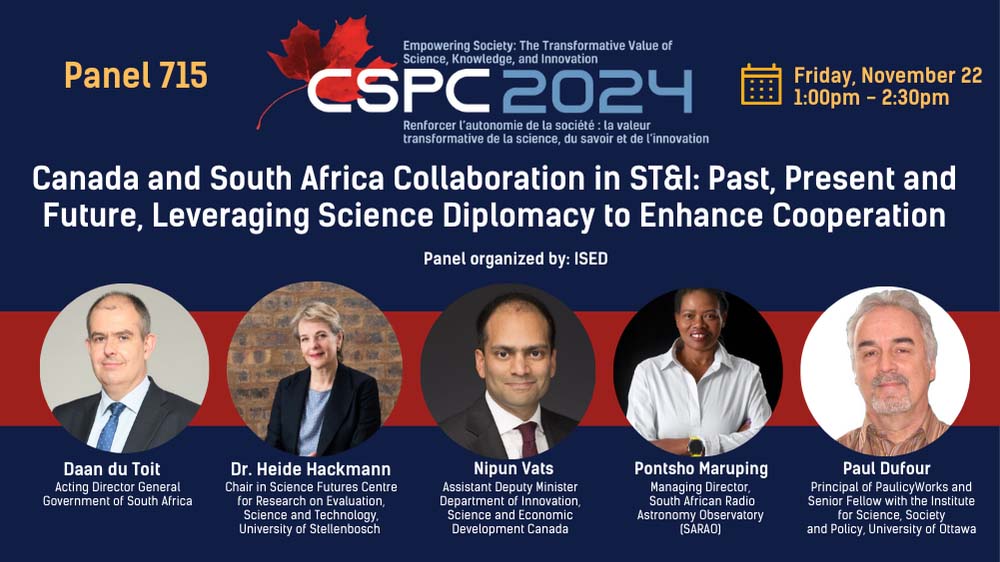Abstract:
In a period of enhanced interconnectedness, and in the face of persistent and shared global-level challenges, science diplomacy emerges as a crucial tool for fostering international cooperation and relationships. This panel will explore how the interplay between scientific collaboration and diplomatic efforts can be harnessed to address global challenges and strengthen international ties. The discussion will include: defining science diplomacy; its challenges and opportunities and showcasing the bilateral science, technology, and innovation relationship between Canada and South Africa, and opportunities moving forward. The session will offer practical insights for scientists, diplomats, policymakers, and anyone interested in the role of science in global diplomacy.
Summary of Conversations
The panel explored the vital role of science diplomacy in fostering international collaborations, particularly between Canada and South Africa, highlighting its significance for advancing economies and societies. The discussions emphasized leveraging science for global challenges like climate change, pandemics, and inequality, with science diplomacy acting as a crucial instrument. The conversation underscored the importance of bilateral relationships in reinforcing multilateralism. Tangible collaborations, such as the Square Kilometer Array (SKA), exemplified successful partnerships, promoting scientific discovery. The discussion also highlighted challenges such as misinformation, geopolitical disruptions, and the need for inclusivity and equity in science governance, including the necessity for adapting to the evolving landscape of international relations to effectively address global issues.
Take Away Messages/ Current Status of Challenges
- Multilateralism faces challenges due to geopolitical disruptions, necessitating stronger bilateral ties to maintain global collaboration.
- Science diplomacy is crucial for addressing global challenges like climate change, pandemics, and inequality, but needs inclusivity in governance.
- The need to address inequality and ensure equitable access to scientific advancements, emphasizing science’s role in promoting stability and justice.
- Misinformation and disinformation pose significant risks, requiring coordinated efforts to combat their spread and promote evidence-based decision-making.
- The importance of scientists engaging with policy and the public to bridge the gap between scientific knowledge and policy implementation.
- Science policies must be informed by an understanding of the political contexts and various factors influencing policy-making.
- The rise of AI governance driven by leading entities potentially protects the elite, exacerbating the equity gap instead of closing it.
- Public education is crucial to attract the next generation and ensure diversity of thought and backgrounds in scientific innovation.
Recommendations/Next Steps
- Evaluate the impact of science diplomacy mechanisms and adapt strategies to enhance their effectiveness in achieving global goals.
- Promote inclusivity and equity in science governance, ensuring that benefits are shared broadly and ethically.
- Develop national science and innovation strategies that align with national priorities and global interests to guide science diplomacy efforts.
- Engage next-generation talent meaningfully in addressing global issues like AI, fostering their perspectives and contributions.
- Strengthen collaboration between science and foreign policy, using science diplomacy as a tool to reinforce multilateralism.
- Address misinformation by promoting scientific literacy and engaging the public in valuing science.
- Encourage scientists to step out of the science diplomacy bubble, to understand and address other decision-making factors.
- Foster openness within the scientific community, encouraging collaboration across disciplines and institutions.
* This summary has been generated with the assistance of AI tools


